published: 31 /
8 /
2013
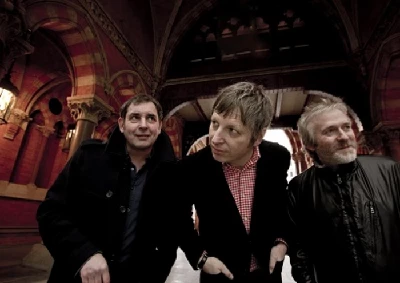
Ben Howarth chats to Austrian-born singer-songwriter and music journalist Robert Rotifer about his indie pop trio Rotifer's forthcoming second UK album, the politically abrasive 'The Cavalry Never Showed Up', which is being released on Gare du Nord, a new label collective
Article
Robert Rotifer's office, in a converted garage outside his home in Canterbury, Kent, is how you like to imagine all your favourite songwriters work. Guitars are mounted on the wall, a piano is in the corner, and around it there are piles of records and books. Darren Hayman's latest album is balanced against the wall, while I spot books Neil Young's autobiography, Simon Reynolds' 'Retromania' and an edition of 'The Idler'.
From here, he works as a music journalist and DJ, for which he is well known in his native Austria. He moved to London in 1997, and has since settled with his family in Canterbury. “I'm privileged to be able to work from home still,” he tells me. “I've managed to turn it into an office, a studio, and a place to listen to records. I'm aware that it is a luxury.”
My first introduction to Rotifer came with the release of his 2011 album, 'The Hosting Couple'. It was the first of his albums to enjoy a full UK release. Despite being released on the fashionable AED label, home to Edwin Collins and being produced by Wreckless Eric, that album received disappointingly little UK media coverage.
The aftermath of our first interview was not entirely happy. Having read the article, Wreckless Eric posted took bizarre offence to innocuous remarks made about the changes Rotifer intended to make for his next album. It seems unlikely the pair will be working together again. More happily, however, Rotifer performed at our Bands Night in November 2012, supporting the Willard Grant Conspiracy. They were so good that we agreed, unanimously, that they would be a first choice to return for our 15th anniversary show, which will take place hopefully in February.
At the time of that first interview (August 2012), sessions for the follow-up album in East London's Soup Studios were half way through. With a new bassist, Mike Stone (on loan from the Television Personalities) and an established drummer, Ian Button (possibly best known as the guitarist in Death In Vegas), it was clear even then that Rotifer thought his new songs to be – by a distance – the best he had ever written.
'The Cavalry Never Showed Up', on sale from October 14th, more than vindicates that judgement. It is significantly more ambitious, both lyrically and musically, than anything he has recorded before. Without losing what was good about earlier songs (a willingness to look beyond the traditional lexicon of rock with a dry wit and an eye for the absurd and unusual), this album sharpens its focus to become a concerted attack on complacency and casual injustice, without ever aspiring to the 'state-of-the-nation' cliché.
The album closes with a song, 'So Silly Now', which explains that, while the songs with blunt political messages from the sixties and seventies still sound exciting, any attempt for a modern rock sound inherently ridiculous. “There are various ways of looking at why pop music isn't as politically astute as it used to be,” he explains. “One reason is we have less attentiveness to lyrics because – with Soundcloud and Bandcamp – there is so much music around. But, even when songs do reach mass appeal, they have to deal with the fact that pop and rock culture has been so integrated into mainstream consumerism that it seems so ridiculous to adopt that pose of the outsider.”
He compares this to the songs of Billy Bragg. “Even in Billy Bragg's case, some of that was artifice, wasn't it – that he modelled himself as a kind of new electric Woody Guthrie. Not being a band was kind of the super-authentic but also artificial way of setting himself apart from a culture that had already at that point been completely subsumed into mainstream consumerism. I think that counter-cultural bedrock is not visible anymore.”
There is, he says, a direct comparison to be made between the language used in the 21st century to promote consumerism and careerism, and the language you used to hear in rock music.“The basic appeal of rock music, especially as a teenager, are tales of the disenfranchised outsider. But those ideas echo the promise of 21st century individualism. If you listen to how people promote success in your career, you'll hear the same kind of vocabulary that you used to hear in rock songs. And so, I thought, why not make this a part of your political message?”
Continuing on this theme, he explains how he sees the modern love of 'retro' as society wishing things were as easy as they used to be. “Listening to the old records – you hear these people singing from a completely naïve perspective, and you can believe them. It is impossible now to be that naïve, it is impossible to believe now that your music can be that important. But you can feel that sincerity in that old music”.
'The Cavalry...' begins with 'I Just Couldn't Eat as Much as I Would Like to Throw Up”, which Rotifer freely describes as “a rant”. When the band play live, it is clear that this song is the one they really look forward to. It has closed their set since the very first time they played it. “It's rare that you have a feeling like that with a song – that it is definitely going to be the one.”
Returning to his comparison to Billy Bragg, he says, “I will never knock him, because his songs meant so much to me, but some of the political sentiments sound incredibly naïve now. But when I was hearing them as a teenager, I just felt 'that needed to be said'. Which links back to my song – I had this feeling that I needed to get everything I felt needed to be said out of my system. In a way, its preposterous, but I enjoyed doing it.”
Another song with a more straightforward political message is 'The New Fares', which mocks the posters which tend to pop up in train stations during the final months of the year heralding the oncoming increase in ticket prices as something we should all look forward to. Even this song, though, is slyer than it first seems, linking the new year's new fares to the return of our favourite birds, "back from the Bosphorus".
More indicative of the album's general tone, however, is 'Last Century', which compares the complacency of 2013 with that of 1913. The idea for the song came out of the amazement at the self-assured predictions made by political and economic journalists about the inevitability of economic recovery. “I'm sure everybody feels the same,” he says. “How can they possible be so sure?”
“Do you know the Austrian author Joseph Roth?”, he asks me. “In the 'Radetzky March', he wrote about society in the Austro-Hungarian empire before the First World War being lulled into this idea that everything will turn out right. That war was a catastrophe for the British as well, but they won and so didn't have that same existential trauma that the Austrians had afterwards. Everything looked as if it was always going to be stable, and then it all collapsed completely, and that's how I feel about now, without wishing to sound too apocalyptic.”
We end up discussing the problems with modern politicians and, in particular, political journalism – clearly pet subjects for both of us. I am in danger of allowing the interview to wander dramatically off the point, but luckily Robert reels us back in, just in time. “Rubbish daily politics is a huge inspiration,” he says. “The way we have been talking about it, it feels so futile that you would rather write a song about it. With that song 'Last Century', I had quite a bit of fun with the phrases, and in a way, you feel better to make light of it, when it's actually quite dark.”
On the day we spoke, Robert had spent the morning listening to all his earlier albums, compiling the songs for a friend who wanted an introduction to his music. It seemed to me, I tell him, that the album 'The Cavalry Never Showed Up' is least like is the one that immediately preceded it, 'The Hosting Couple'.
“Yes,” he agrees. “That is through what we talked about last time – basically I felt I had done a certain kind of album, and I shouldn't replicate it. In fact, it was the album before that, 'The Children on the Hill', which was intended to do what I think this new album actually does do – take you on a journey through a wide range of styles.”
“I think what you said before is right – it is not a huge departure from what I have done before. But I think what I am able to do is to work on getting incrementally better at the type of songwriting that I do.”
He continues, “If I had the privilege to be a full-time songwriter, I would probably have the space to think about how to approach songwriting from a completely new angle, but I think that is one of the things we have lost now so few people make a living just from music. So, what I try and do is focus on getting incrementally better at this kind of songwriting."
“I think my earlier stuff tries to do what this album does, but – the way I see it now – often fails. This time, I could do it with Ian and really get on his nerves and change things around and do things again and again.”
That is not to say that the album is the product of a large recording budget or luxurious production facilities. In fact, the band spent just two days in Soup Studios, and recorded the rest at home. “The room you are sitting in now, a lot of the album was made in here,” Robert tells me. “Overdubs and the acoustic parts were all done in here, and it's quick and so simple. When you are at home, you have the leisure to try things again and again. I guess in the 1980s, what made up what we think of as the trademark 'indie' sound is actually just people not having the chance to go back and re-do the mixing. I think it's evident that we took a long time over the arrangements.”
The biggest difference between “The Cavalry...” and earlier Rotifer albums, Robert believes, is that Rotifer had become a band. He is in the early stages of recording an album of German-langauge songs, working with Pete Astor and Alison Cotton, and says, “It brought home to me how that was not Rotifer, and how – as it is now with Mike and Ian – Rotifer is not just my songs, it is a band.”
An example of this comes on the album's third song, 'Black Bag' - his first time recording a song without meticulously planning its sound in advance. He lights up when I tell him that its instrumental introduction, much to my surprise, reminded me immediately of 'Dark Side of the Moon'-era Pink Floyd.
“Ah, it's funny you mention that – this is one of the ways in which this album is far more of a band album than before. I really wanted a song come from the band playing together in the room, so I came up with a chord sequence that I felt we could all play over. I played it to them at the end of day two at Soup, and we recorded it twice, with us getting gradually louder and then fading out, just from playing and nodding to each other as we played. I really enjoyed that.”
“Mike wanted to play it on piano, instead of on bass, and he started out very quietly, and I remember as he started out on those chords, I thought exactly what you thought – this sounds like Pink Floyd, doesn't it? I've hardly done that before – when you work as a band so that things happen which are beyond your own taste control.”
Also in the studio was Paul Rains, guitarist with Allo Darlin' and Hexicon, who had been recruited to add some lap steel. Insisting that Robert added the lyrics, so he had something to play too, the vocals were recorded live as he added lap steel to the earlier take. “The reason this song is so important to me is that I just improvised along to what we had played, and as I sung, it fit perfectly. I reached the chorus exactly as the drums came in. At that point, the mic stand was keeling over and I finished the song almost on my back, but every change worked with the song. I just had to keep going. I couldn't believe how that happened. It was completely a fluke.”
Confidence in his bandmates certainly encouraged this album's more expansive sound, inspired in particular by seeing Wilko Johnson perform in close quarters, at Rough Trade East, and experimenting with his fingerpicked electric guitar solo, and also by the confidence his friends the Wave Pictures have in their guitar solos.
“It's been great fun to play with Mike, who is an amazing bass player, and it really felt that I could – the awful cliché – 'stretch out'. Things like, 'For Now There is Only Love' and real rock songs like, 'The Optimist Out in the Open Sea'. The stuff I was doing on the guitar, it felt like – as the sole guitar player – there was something there even if I stopped playing. I allowed for a lot more silences – and when I allowed for those silences, it meant I had the space to play solos.”
He tells me, “I think guitar solos were a hangup of punk, which we are getting over, but also we now consider why to have a solo more. I feel that the songs are more open because there is less of me singing. In that sense, it makes dramatic sense within the album – it's not showing off.”
Only one song on the album doesn't feature all of the current Rotifer line-up, the acoustic 'Wear and Tear', recorded in Canterbury with a Salvation Army band. That song was recorded in time for 'The Hosting Couple', but didn't quite fit with that album's more singular tone. “I wanted it to be the last track, but Wreckless Eric felt it didn't fit – I think he was right about that. That song was a departure for me. I taught myself the correct way to write notation for those instruments. It didn't all work, but I had learned enough to correct it on the spot.”
As usual, the album will be released on an Austrian label, while in the UK, it will be the first release on a new label, Gare Du Nord. The idea is that it will function as a collective, with subsequent releases planned including a debut album from singer-songwriter Ralegh Long and the first release from Papernut Cambridge, the songwriting vehicle for Rotifer drummer Ian Button. Everyone involved will appear at a label launch night at London's Betsy Trotwood in October.
The idea to set up Gare Du Nord came from Jerv, who runs his own label (WIAIWYA) and also promotes the Hangover Lounge, a Sunday afternoon club in London at which Rotifer has performed several times.
“He had this idea - 'You know all these other people who make music, why don't you form a collective?',” Rotifer explains. “We had been asking around labels, but we would have been funding ourselves and it seemed almost ridiculous to not go the rest of the way. Labels don't have a lot to offer bands these days – the days of the advance are pretty much gone.”
“The Rotifer album will be the first release for the label, because it was the first thing finished. The irony being that Ian's album has now arrived, while mine are still at the pressing plant,” he adds. Also on the release schedule is a compilation, where Gare Du Nord bands will cover songs from their favourite artists, and then have their own songs covered in return.
The plan is that the label will also offer a vehicle for some of Robert's favourite Austrian bands to be introduced to British ears. Well known in Austria as a music journalist and DJ, Rotifer curated the first two years of the International Popfest in Vienna, and had just returned from the festival's third year when I spoke to him. “Ian came up with the name for the label. In a way it is a trashy shorthand, for having one foot on the continent. But, with Canterbury also being halfway to the continent from London, it seemed fitting in a way”.
For someone who is as happy talking about other people's music as his own, combining making music with running a label seems an obvious career progression, but in fact, he tells me that – given a choice – he would be happy to let someone else release his records. But, he adds, “while I would prefer not to do it myself, I have to admit that there was never a home for me in the traditional music industry. When that was the only way to put records out, I couldn't get signed to save my life.”
A brief foray into that world had come when living in Austria, with his band the Electric Eels signed to a publishing deal with Warners. “It didn't get anywhere. It was an interesting lesson in how having an office full of people didn't mean anything was going to happen.”
As yet, it remains to be seen whether the media at large will pick up on “The Cavalry Never Showed Up”. He admits that he is nervous about the band's then forthcoming next show at the Buffalo Bar, as he has tended to support other artists rather than headline. When we last spoke, he told me that his ambition was to build an audience for live performances. As we finish, he tells me that he believes that audience has begun to develop and ends by saying that his ambition is to play more often outside London.
The colour photographs that accompany this article are by Sophia Di Martino, and the black and white ones by Nic Newman.
Band Links:-
https://www.facebook.com/robert.rotife
Picture Gallery:-
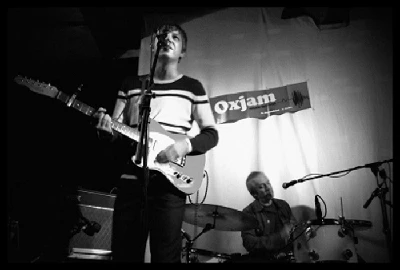
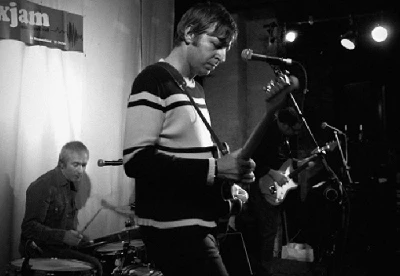
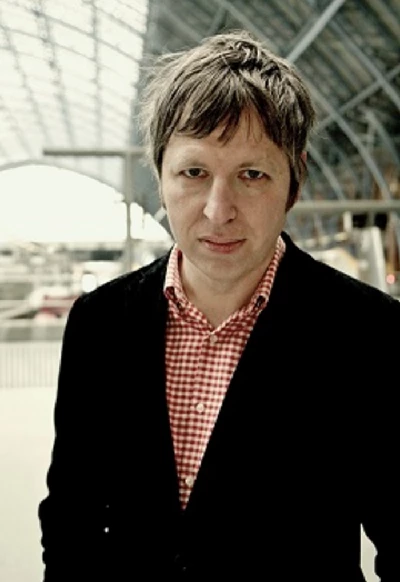
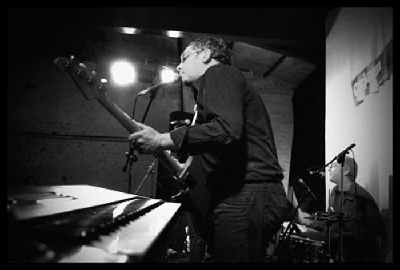
Visitor Comments:-
|
|
649 Posted By: John Howard, Spain on 25 Sep 2013 |
Very interesting. Love Rotifer's work. Good to read something so eruditely written about an erudite chap. Excellent.
|